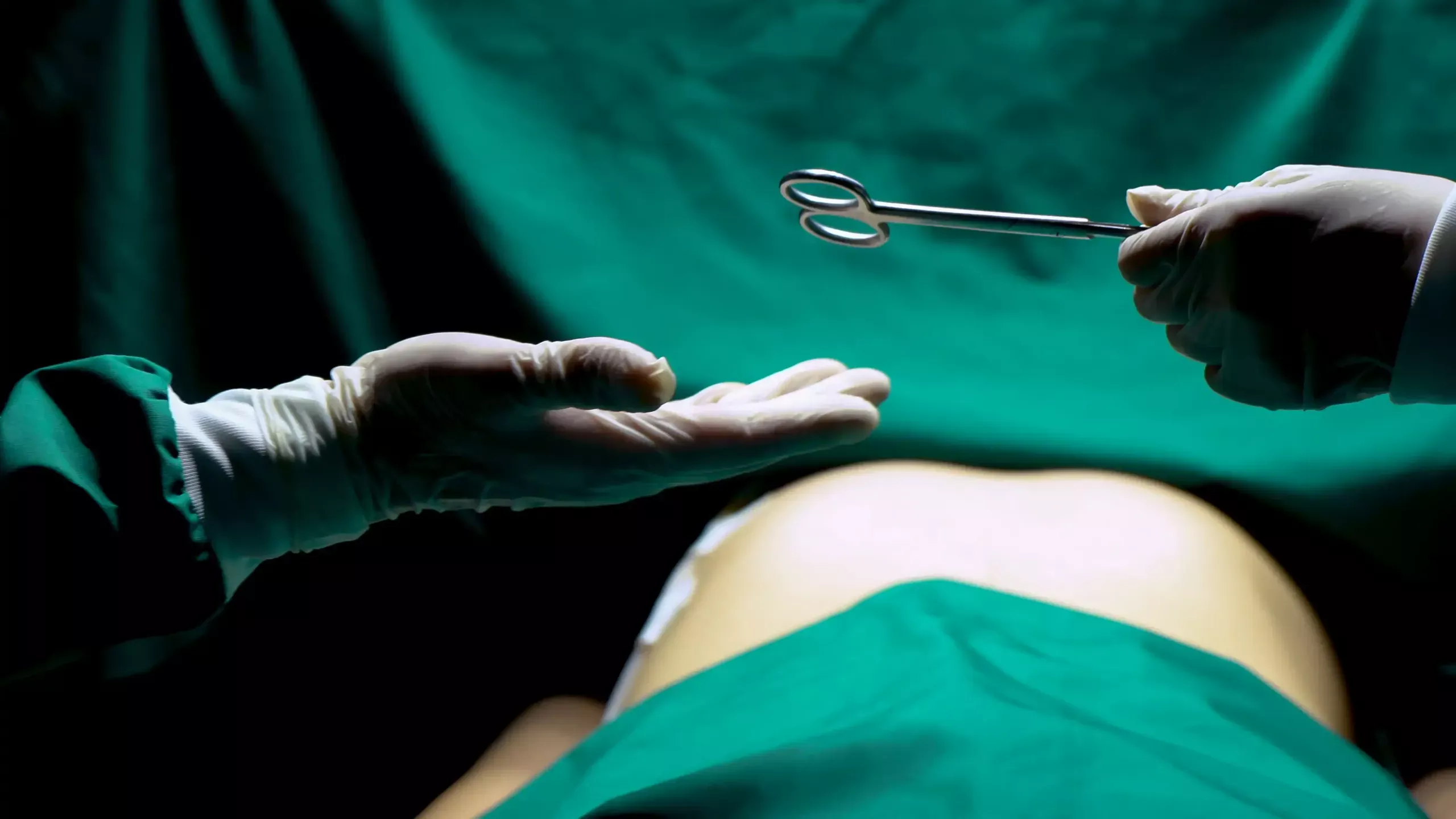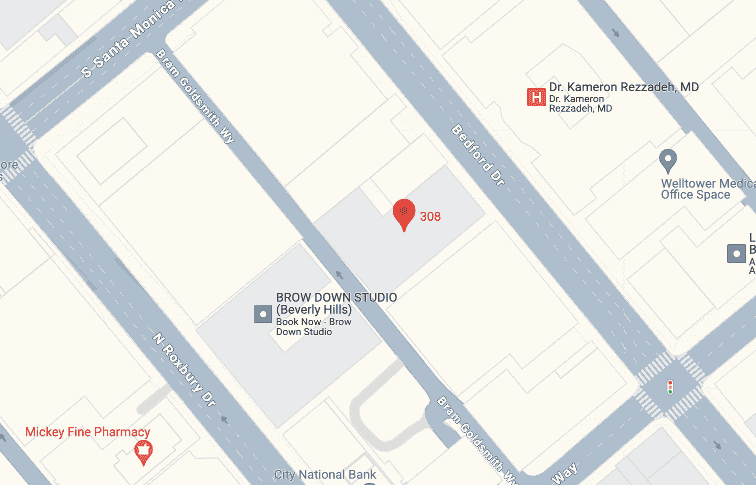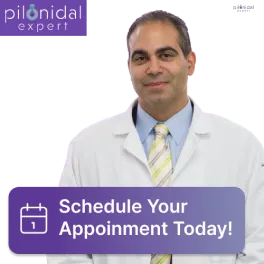A pilonidal cyst doctor, also known as a specialist in colorectal surgery or a dedicated expert in managing pilonidal disease, is the ideal healthcare professional to consult for comprehensive assessment and treatment of this condition.
Understanding the nature of these cysts and seeking proper treatment from a specialized pilonidal cyst doctor is crucial for effective management. Let’s delve into the intricacies of pilonidal cysts and explore how a specialized doctor for pilonidal cyst can assist in their treatment.
What is a Pilonidal Cyst?
An abnormal pocket or sac containing skin tissue, hair, and debris is called a pilonidal cyst. These cysts, which are usually located at the top of the buttocks close to the tailbone, can get infected and cause symptoms including discomfort, swelling, redness, and pus or blood leaking out. Pilonidal cysts are more common in young adults, especially in men, and can be made worse by friction in the affected area, lengthy periods of sitting, and an abundance of hair.
Seeking Assistance from a Pilonidal Cyst Doctor
To ensure a precise diagnosis and successful treatment, speaking with a physician who specializes in colorectal surgery or pilonidal cysts is imperative. With their extensive training and experience in treating pilonidal cysts, these experts can provide individualised therapy for every patient.
Diagnosis and Assessment
A physician who treats pilonidal cysts will ask you about your symptoms, check your medical history, and perform a comprehensive physical examination. To assess the size of the cyst and any potential side effects, such as the development of an abscess, imaging tests like an MRI or ultrasound may be advised in specific situations.
What is the Procedure to Remove a Pilonidal Cyst?
Surgical intervention is required when a pilonidal cyst becomes recurrent, presents with severe symptoms, or results in complications such as the formation of an abscess. A physician who treats pilonidal cysts will evaluate the size and intensity of the cyst and suggest a suitable surgical approach. The surgeon’s experience and the particular condition of the patient are major factors in the surgical procedure selection process.
1. Incision and Drainage:
A doctor may carry out an incision and drainage treatment in the event of an acutely infected cyst. This relieves pain and discomfort right away by creating a tiny incision in the cyst to release the accumulated pus. This process might not, however, stop recurrences in the future.
2. Excisional Surgery:
Excisional surgery to remove pilonidal cyst is typically advised for persistent or recurring pilonidal cysts. The damaged tissue and sinus passages, as well as the cyst, must be removed during this treatment. The surgeon will select amongst various surgical techniques:
Open Excision: In this conventional method, an incision is made, the cyst is removed, and the wound is then allowed to heal spontaneously over time. It may take a few weeks for healing to occur, and throughout this time, dressing changes must be made often.
Minimally Invasive Techniques: Procedures like the cleft lift or pit picking are minimally invasive options. While pit picking removes hair and debris from the cyst without removing a significant amount of tissue, cleft lift repositions the skin in the afflicted area to prevent recurrence.
3. Postoperative Care:
To encourage healing and avert infection, appropriate wound care is essential following pilonidal cyst removal surgery. Your surgeon for pilonidal cysts will give you comprehensive instructions on how to take care of the surgical site, including how to clean it, how to dress wounds, and whether you need to use pain medication.
4. Recovery and Follow-up:
Individual healing rates and the type of surgery performed affect the length of recovery. While some patients could need more time to heal, others might be able to resume their regular activities in a few of weeks.
It is imperative to schedule follow-up visits with the physician for pilonidal cysts in order to track the healing process, evaluate any difficulties, and offer advice on how to avoid recurrence. Additionally, they could offer lifestyle advice to reduce the likelihood of cyst development in the future.
Is Pilonidal Cyst Laser Surgery Painful?
For certain circumstances, some specialists use a relatively modern method called laser surgery for pilonidal cysts. When compared to standard surgical approaches, the use of lasers is intended to provide a number of advantages, including decreased bleeding, faster healing, and maybe lower recurrence rates. But each person experiences pain differently, so it’s important to be aware of the possible discomfort this operation may cause.
Procedure for Laser Surgery:
Using concentrated light energy, the cyst and damaged tissue are targeted and removed during laser surgery. Usually, the goal of the process is to cure the cyst as successfully as possible with the least amount of damage to the surrounding healthy tissue.
To assure the patient’s comfort and pain relief throughout the treatment, local anesthetic, or occasionally general anesthesia, is delivered throughout the surgery.
Pain Perception and Recovery:
Although postoperative pain from laser surgery is frequently lower than with open excision treatments, some patients may still feel discomfort.
The extent of the cyst, the particular laser technique employed, and each patient’s pain threshold can all affect how painful laser surgery is.
Patients typically experience mild to moderate discomfort, which can be controlled with the right wound care and prescription painkillers.
Furthermore, compared to traditional surgery, laser surgery may facilitate faster recovery and shorten the amount of time that patients experience discomfort.
Benefits of Laser Surgery:
Less postoperative pain: Compared to open excision techniques, laser surgery often causes less pain for recovering patients.
Shorter recovery time:
Laser surgery’s minimally invasive technique may promote faster healing and a shorter recuperation time.
Potentially lower recurrence rates:
Research is needed to substantiate the suggestion that laser treatments may result in a decreased recurrence rate of pilonidal cysts when compared to standard procedures.
Consultation with an expert:
It’s critical to talk with an expert about the possible advantages, dangers, and discomfort that may arise after laser surgery for pilonidal cysts.
A physician who specializes in colorectal surgery or pilonidal cysts can offer tailored guidance based on your particular situation, assisting you in selecting the best course of action.
What Type of Doctor is Certified to Remove a Pilonidal Cyst?
A specialist in colorectal surgery sometimes referred to as a “pilonidal cyst doctor” is a qualified healthcare provider with experience and training in the diagnosis and treatment of pilonidal cysts. These physicians have specialized training, knowledge, and experience in treating disorders related to the tailbone region, such as pilonidal cysts.
Expertise of a Pilonidal Cyst Doctor:
Colon Surgeons: Doctors that treat pileonidal cysts are frequently colorectal surgeons with advanced training in operations pertaining to the colon, rectum, and adjacent regions. They specialize in treating disorders affecting the tailbone region, such as pilonidal cysts.
Experience and Certification:
These experts are certified in both general and colorectal surgery, attesting to their proficiency in executing a range of surgical procedures for the excision of pilonidal cysts.
Comprehensive Diagnosis and Treatment:
Pilonidal cyst Physicians possess the skill to correctly identify pilonidal cysts by performing physical examinations, reviewing medical histories, and ordering imaging tests as needed. They suggest suitable treatment regimens that, depending on the cyst’s severity and recurrence, may include both non-surgical and surgical procedures.
Surgical Proficiency:
These physicians are proficient in a number of minimally invasive surgical methods, including pit picking and cleft lift, as well as open excision and, in certain situations, laser surgery, for the removal of pilonidal cysts.
Patient-Centered Care:
Pilonidal cyst doctors prioritize personalized care, considering each patient’s unique condition, symptoms, and medical history. They offer thorough instructions on how to prepare for surgery, how to do the treatment, how to care for yourself afterward, and how to lower your chance of cyst recurrence.
Discover Unmatched Care with Pilonidal Experts!
Are you or a loved one suffering from the discomfort of a pilonidal cyst? Look no further than Pilonidal Experts, the leading authorities in managing and treating pilonidal cysts in town.
Contact us today to schedule an appointment with a pilonidal cyst doctor and take the first step toward effective relief from pilonidal cysts. Trust in our team for unmatched care that puts your well-being first!








